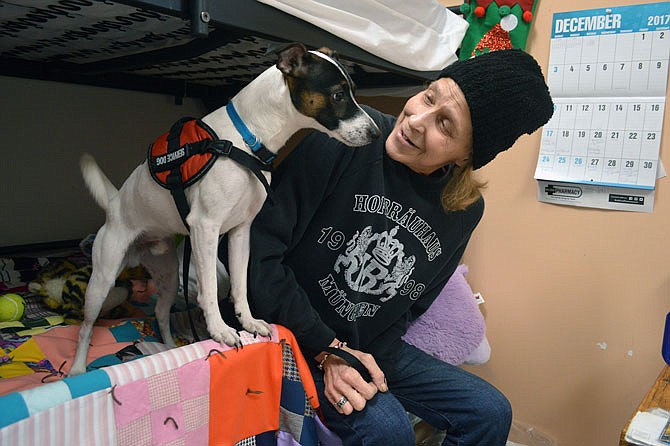On the edge of her bed at The Salvation Army Center of Hope Shelter, Tammy Collett sat, contemplating what lies ahead for her when she leaves the shelter.
On her lap sat her service dog, Homie, so named because Collett got him about 17 months ago while homeless.
"He's my everything right now," Collett said.
For the past month, they've shared one-bed in a three-bed room at the shelter. While the future remains uncertain, she and about 30 other residents at the shelter are working to get on their feet and move out.
With bitterly cold temperatures blasting the region, Salvation Army officials said they've see an increase in the amount of homeless residents from around the region needing a place to stay. Still, they and residents said the city has adequate services to meet the demands of the city's homeless population. For residents at the shelter like Collett, the shelter gives them a place to work to get back on their feet while staying off the streets and out of the cold.
For years, Collett worked in manufacturing at factories around Mid-Missouri. Her last job was at American Air Filter's factory in Columbia. Today, she's disabled because of conditions like COPD, emphysema and nerve damage to her legs, among other conditions.
"I'll never be able to work again," Collett said.
Collett moved into the shelter about a month ago after losing her public housing in Fulton. Before that, she was previously homeless in Fulton.
Because of her disabilities, she said she had no money to pay her bills.
"If you can't work, you can't survive; you have nobody that helps you to survive," Collett said.
William Cayce moved into the shelter about two months ago after being released from jail. While he looked for work, Cayce planned to live with his mother or his sister, but those plans fell through. He said he felt that bit of bad luck became a blessing because the center helped him apply for jobs and the federally-funded Supplemental Security Income program.
"This place allowed me the opportunity to re-establish myself," Cayce said.
The shelter at 927 Jefferson St. provides 31 beds to men, women and families. With bed space full, the shelter sets up 20-30 cots as needed in its dining room.
The National Weather Service forecasted high temperatures of 10 degrees for today and Monday. A wind chill advisory also took effect Saturday and remains in effect until noon Monday. As the city's only shelter, the staff feels a responsibility to welcome in as many people who need respite from the cold as possible. Cots become available at 8 p.m., but the staff invites residents-in-need to get breakfast, lunch, dinner or snacks inside the shelter.
"We're willing to do what we can," Allen House, a monitor at the shelter, said.
Around 2 p.m. Saturday, House said the shelter already received seven calls from people needing a place to go to get out of the cold.
In all, the shelter offers its clients showers, laundry services, a food pantry and other services to help them get back on their feet. Collett and Cayce and said The Salvation Army provides adequate services for the city's homeless population with the shelter.
The Jefferson City Housing Authority also provides 318 public housing units and 421 housing units through other sources of funding for low-income residents. Cayce said people at the shelter often use that program to find housing in the city.
Collett said, though, the city could have more transitional housing shelters, which help people move from homeless shelters, jails, addiction centers or mental health facilities into regular housing. An effort by a Springfield-based developer to build 75 apartments for low-income families became stalled after the Missouri Housing Development Commission voted to withhold funding for the state's low-income housing tax credit.
The Salvation Army offers basic career counseling services by helping residents apply for jobs, school and other programs. House said The Salvation Army also recently began pushing for more help from the business community to assist its clients in finding jobs.
Because pick-ups on Jefferson City's bus routes stop around 5:30 p.m. each night, Alice Sykes said it can sometimes be hard for homeless residents without cars to get around.
"It's very hard because I get off at 9:30 p.m., and if I don't get a ride with someone, I have to get a cab," Sykes said. "I need a car bad."
House said demand is there from the city's homeless community for a separate shelter, but The Salvation Army prefers to expand its shelter.
"We should improve the one we have now," House said.
Whether during cold weather or hot weather, The Salvation Army's goal is for the shelter's residents to find places of their own. Sykes, 75, entered the shelter Oct. 23 after moving from Kansas City to be closer to her son. She had an apartment lined-up but it wasn't ready, and she couldn't stay with her son.
Landing in the shelter helped her find jobs cleaning at the Truman Building and as a nurse's assistant at Phoenix Home Care. Sykes also takes classes at the ABLE Learning Center at 204 E. Dunklin St.
After over two months in the shelter, Sykes plans to move out Jan. 15.
"I'm happy about that," she said. "Step-by-step."

